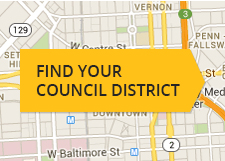Council President to Introduce Ethics Reform and Harm Reduction Legislation at First Council Meeting of the Year
Council President to Introduce Ethics Reform and Harm Reduction Legislation at First Council Meeting of the Year
Bills Address City’s Overdose Epidemic and Clarify When Elected Officials Can Accept Gifts
BALTIMORE, MD (January 13, 2020) — Council President Brandon Scott will introduce legislation at the first City Council meeting of the year on ethics reform and confronting Baltimore’s overdose epidemic through a harm reduction lens. The meeting will take place this evening at 5PM in the “Du” Burns Council Chambers.
Council President Scott said, “Our constituents deserve to know the City Council is working on their behalf to close all ethics loopholes and become more accountable to them.” The Council President will:
- Introduce 20-0483: “Public Ethics Law - Gifts to Elected Officials and Staff,” which clarifies a loophole in existing public ethics law. This bill clarifies that elected officials and their staff may not accept gifts from any lobbyist, person who does business with the City, or anyone with a financial interest that might be impacted by their duties as an official. Elected officials and their staff are currently prohibited from accepting gifts from people they know are lobbyists; this ordinance clarifies that elected officials and their staff may not accept gifts from anyone they should reasonably know to be a lobbyist.
- Reassign 19-0378: “Ethics Board - Administration and Staff,” sponsored by Councilman Ryan Dorsey, to the new Equity and Structure Committee and call for a hearing. Currently, a small volunteer Board of Ethics conducts investigations into potential violations of the Ethics Code with no full-time staff and no budget. This bill would move the Ethics Board from the Department of Legislative Reference, which is primarily tasked with bill drafting and legal research, to the Office of the Inspector General where it can be properly staffed and supported. The bill was assigned to the Judiciary Committee in July 2019.
- Introduce 20-0189R: “Informational Hearing - Overdose Prevention Sites,” which calls for a hearing to explore overdose prevention sites, the services they provide, and how they fit into an evidence-based, harm reduction approach to address Baltimore’s overdose epidemic.
- Introduce 20-0188R: “Informational Hearing - Syringe Service Expansion,” which calls for a hearing on the status of syringe service programs in Baltimore City and statewide. The hearing will look at Baltimore’s needle exchange program, administered by the Health Department, and the role of community-based direct service providers.
“Our city has experienced an overdose epidemic for my entire life, yet we have not done enough to address it as the public health crisis it is. Since 2015, there have been 3,500 fatal overdoses in Baltimore,” said Council President Scott. “I look forward to starting the conversation about overdose prevention and harm reduction in City Hall, side by side with direct service providers and advocates, so we can invest in proven solutions and take action to save lives.”
The Council President named ethics reform and cleaning up city government a top priority in his Legislative and Policy Agenda released in July 2019. Members of the public can use the Council President’s Legislative and Policy Tracker to follow along with the policy process.
View the agenda for today’s City Council meeting here.
CONTACT
Candance Greene
Deputy Director of Communications
Office of City Council President Nick J. Mosby
443-602-5346
candance.greene@baltimorecity.gov

